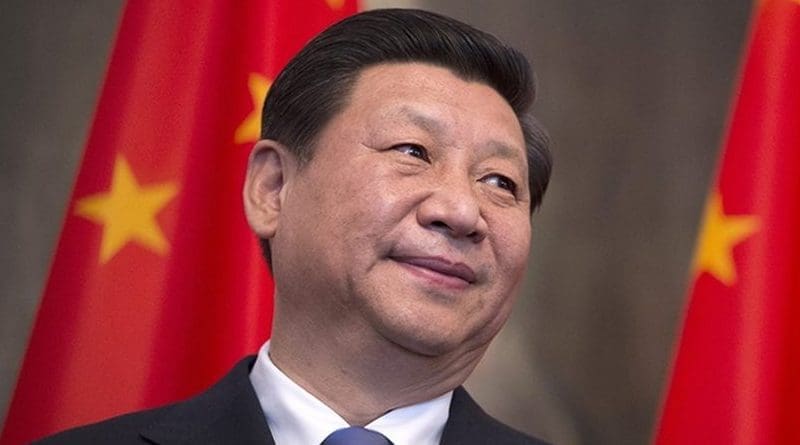Will Pope Francis Meet Xi Jinping In Kazakhstan Next Week?
By CNA
By Courtney Mares
Chinese President Xi Jinping is expected to visit Kazakhstan on the same day Pope Francis will be in the Central Asian country next week.
The Kazakh Foreign Ministry has announced that Xi will meet Kazakhstan’s President Kassym-Jomart Tokayev on Sept. 14 during the pope’s three-day visit to the capital, Nur-Sultan.
The coinciding visits of Francis and Xi come as the Holy See and China are in negotiations over the renewal of a provisional agreement on the appointment of bishops in China.
Vatican-China deal
Vatican Secretary of State Cardinal Pietro Parolin said in an Italian television interview on Sept. 2 that a delegation of Vatican diplomats has returned from China and that he believes that the agreement will be renewed this fall.
It would be the second time the agreement with Beijing has been renewed since the Holy See first signed it in September 2018.
Beijing severed diplomatic ties with the Holy See in 1951 after Mao Zedong came to power in the Chinese Communist Revolution and expelled missionaries from China.
Without diplomatic relations, a potential encounter between Xi and Pope Francis would be unofficial. There has never been a meeting between a pope and a president of China in the history of the Church.
Religious freedom violations
A source working in the Kazakh parliament told CNA that “theoretically it is possible” that the pope and the president could meet.
Pope Francis will participate in the Congress of Leaders of World and Traditional Religions in Kazakhstan on Sept. 13–15.
The pope is scheduled to hold private meetings with some of the participants in the interreligious summit at noon on Sept. 14, the day of Xi’s visit to the Kazakh capital.
However, it is unlikely that the Chinese leader will take part in the summit of Muslim, Christian, and other religious leaders.
Xi has come under mounting international condemnation for China’s brutal persecution of Uyghur Muslims in the northwest Chinese region of Xinjiang.
The United Nations published a report on Sept. 1 that documented “serious human rights violations” in Xinjiang, including patterns of torture, detention, and sexual violence against the religious minority in China.
Kazakhstan would be Xi’s first official trip outside of China since the start of the COVID-19 pandemic, in which he oversaw the world’s strictest lockdowns.
According to the Wall Street Journal, Xi’s trip to Central Asia could also include a meeting in Uzbekistan with Russian President Vladimir Putin.
Taiwanese visit to the Vatican
One day before the news of Xi’s upcoming visit to Kazakhstan was made public, the former vice president of Taiwan met with Pope Francis at the Vatican.
Taiwanese President Tsai Ing-wen said that the former VP, Chen Chien-jen, was at the beatification of John Paul I on Sept. 4 as a representative of Taiwan.
Chen wrote on social media that he was “specially received” by the pope ahead of the beatification and asked Pope Francis “pray for the people of Taiwan.”
The Holy See is one of only 14 states that have formal diplomatic ties with Taiwan, officially the Republic of China (ROC), and the only entity in Europe that recognizes Taiwan as a country.
Beijing views Taiwan as a rebel province and has pressured countries to end ties with Taiwan, influencing seven countries to shift their diplomatic ties from Taipei to Beijing since 2016. It is widely believed that Beijing would demand dropping ties with Taiwan as a prerequisite for reestablishing diplomatic relations with the Holy See.
In the backdrop of any encounter with Chinese officials during the papal trip is the arrest and the upcoming trial in Hong Kong of a Catholic cardinal, who has been an outspoken advocate for religious freedom and democracy.
Cardinal Joseph Zen, the bishop emeritus of Hong Kong, is set to stand trial along with four other people in Hong Kong Sept. 19–23 in connection to his role as a trustee of a pro-democracy legal fund.
Following a meeting of 197 Catholic cardinals at the Vatican last week, Cardinal Gerhard Ludwig Müller expressed disappointment that the cardinals did not use the consistory meeting as “an opportunity to declare full solidarity with Zen on the part of all the College of Cardinals.”
“From the silence of this consistory on the Zen case I have fears,” the prefect emeritus of the Congregation for the Doctrine of the Faith told Il Messaggero on Sept. 1.
He added that there was not even a proposal for a collective prayer for Zen.
“There are obviously political reasons on the part of the Holy See that prevent such initiatives. I am referring to the agreement for the renewal of bishops recently signed with Xi’s government,” Müller said.
“Perhaps the Church should be freer and less bound to power-based, worldly logic, consequently freer to intervene and, if necessary, to criticize those politicians who end up suppressing human rights. In this case, I wonder why not criticize Beijing,” he added.
“Zen is a symbol and he was arrested on a pretext, he did nothing, he is an influential, courageous, and much feared figure by the government,” he said. “He is over 80 years old and we have left him all alone.”

